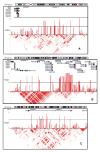Genome-wide association study of recurrent early-onset major depressive disorder
- PMID: 20125088
- PMCID: PMC6486400
- DOI: 10.1038/mp.2009.124
Genome-wide association study of recurrent early-onset major depressive disorder
Abstract
A genome-wide association study was carried out in 1020 case subjects with recurrent early-onset major depressive disorder (MDD) (onset before age 31) and 1636 control subjects screened to exclude lifetime MDD. Subjects were genotyped with the Affymetrix 6.0 platform. After extensive quality control procedures, 671 424 autosomal single nucleotide polymorphisms (SNPs) and 25 068 X chromosome SNPs with minor allele frequency greater than 1% were available for analysis. An additional 1 892 186 HapMap II SNPs were analyzed based on imputed genotypic data. Single-SNP logistic regression trend tests were computed, with correction for ancestry-informative principal component scores. No genome-wide significant evidence for association was observed, assuming that nominal P<5 × 10(-8) approximates a 5% genome-wide significance threshold. The strongest evidence for association was observed on chromosome 18q22.1 (rs17077540, P=1.83 × 10(-7)) in a region that has produced some evidence for linkage to bipolar-I or -II disorder in several studies, within an mRNA detected in human brain tissue (BC053410) and approximately 75 kb upstream of DSEL. Comparing these results with those of a meta-analysis of three MDD GWAS data sets reported in a companion article, we note that among the strongest signals observed in the GenRED sample, the meta-analysis provided the greatest support (although not at a genome-wide significant level) for association of MDD to SNPs within SP4, a brain-specific transcription factor. Larger samples will be required to confirm the hypothesis of association between MDD (and particularly the recurrent early-onset subtype) and common SNPs.
Conflict of interest statement
The authors report no competing interests.
Figures


References
-
- Pakriev S, Shlik J, Vasar V. Course of depression: findings from cross-sectional survey in rural Udmurtia. Nordic journal of psychiatry. 2001;55(3):185–189. - PubMed
-
- Blair-West GW, Cantor CH, Mellsop GW, Eyeson-Annan ML. Lifetime suicide risk in major depression: sex and age determinants. Journal of affective disorders. 1999 Oct;55(2–3):171–178. - PubMed
-
- American Psychiatric Association. Diagnostic and Statistical Manual of Mental Disorders. 4. American Psychiatric Press; Washington, D. C: 1994.
-
- Sullivan PF, Neale MC, Kendler KS. Genetic epidemiology of major depression: review and meta-analysis. Am J Psychiatry. 2000 Oct;157(10):1552–1562. - PubMed
-
- McGuffin P, Katz R, Watkins S, Rutherford J. A hospital-based twin register of the heritability of DSM-IV unipolar depression. Arch Gen Psychiatry. 1996 Feb;53(2):129–136. - PubMed
Publication types
MeSH terms
Substances
Grants and funding
LinkOut - more resources
Full Text Sources
Miscellaneous

